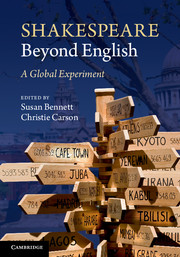Book contents
- Frontmatter
- Contents
- List of Illustrations
- List of colour plates
- Notes on contributors
- Foreword
- Acknowledgements
- Introduction
- The Globe to Globe Festival: An Introduction
- Performance Calendar
- Week One
- Chapter One U Venas no Adonisi
- Chapter Two Festival showcasing and cultural regeneration
- Chapter Three ‘What's mine is yours, and what is yours is mine’
- Chapter Four ‘The girl defies’
- Chapter Five Pericles and the Globe
- Chapter Six Technicolour Twelfth Night
- Week Two
- Week Three
- Week Four
- Week Five
- Week Six
- Afterwords
- Index
- Plate section
- References
Chapter Four - ‘The girl defies’
A Kenyan Merry Wives of Windsor
Published online by Cambridge University Press: 05 June 2014
- Frontmatter
- Contents
- List of Illustrations
- List of colour plates
- Notes on contributors
- Foreword
- Acknowledgements
- Introduction
- The Globe to Globe Festival: An Introduction
- Performance Calendar
- Week One
- Chapter One U Venas no Adonisi
- Chapter Two Festival showcasing and cultural regeneration
- Chapter Three ‘What's mine is yours, and what is yours is mine’
- Chapter Four ‘The girl defies’
- Chapter Five Pericles and the Globe
- Chapter Six Technicolour Twelfth Night
- Week Two
- Week Three
- Week Four
- Week Five
- Week Six
- Afterwords
- Index
- Plate section
- References
Summary
At the end of the 1980s a renewed push to Africanize Kenya's secondary school literature curriculum prompted Kenyan President Daniel arap Moi to intervene and insist that Shakespeare, who he declared a universal genius, retain a permanent position in the nation's schools; today, Shakespeare continues to appear in a curriculum that otherwise centralizes African literature in English. A chuckling admission by Kenyan actor Sharon Nanjosi when asked by a member of the Globe research team about her experience of Shakespeare offers another perspective on the cultural and political matrix that informed the Swahili Merry Wives of Windsor that she and her compatriots brought to the Globe to Globe Festival in 2012: ‘I never grew up with Shakespeare. I only saw Romeo + Juliet, the movie…the one with Leonardo DiCaprio.’ It is no great insight to point out that the only Kenyan name that would come as trippingly off the tongue of the average Westerner as DiCaprio does off Nanjosi's is, as history would have it, Barack Obama. What is more telling is the fact that Nanjosi attributes her awareness of Shakespeare's work more to a product distributed globally by 20th Century Fox than to her Kenyan education.
The Africanization of the literature curriculum was hard won. Following Kenya's independence in 1963, debates concerned not only authors’ backgrounds but also the language in which they wrote. Born some two generations before Nanjosi, the acclaimed Kenyan writer Ngũgĩ wa Thiong'o recalls that when a state of emergency was declared in Kenya in 1952 and all schools came under the authority of the British, ‘English became more than a language: it was the language.’ Despite a landmark 1974 conference at the University of Nairobi (spearheaded by Ngũgĩ) on the teaching of African literature in secondary schools, the drive for an indigenous literature curriculum only gained pace in the 1980s. Even in the context of Swahili advocacy, former president of Tanzania Julius Nyerere's Swahili translations of Julius Caesar (1963, revised as Juliasi Kaizari in 1969) and The Merchant of Venice (Mapebari wa Venisi, 1972) implicitly bolstered the perception that Shakespeare had cultural validity for Africans.
- Type
- Chapter
- Information
- Shakespeare beyond EnglishA Global Experiment, pp. 53 - 62Publisher: Cambridge University PressPrint publication year: 2013



